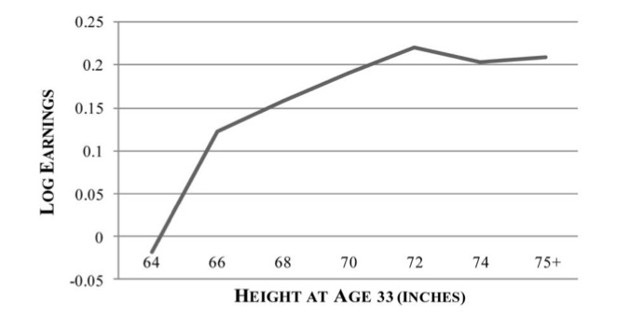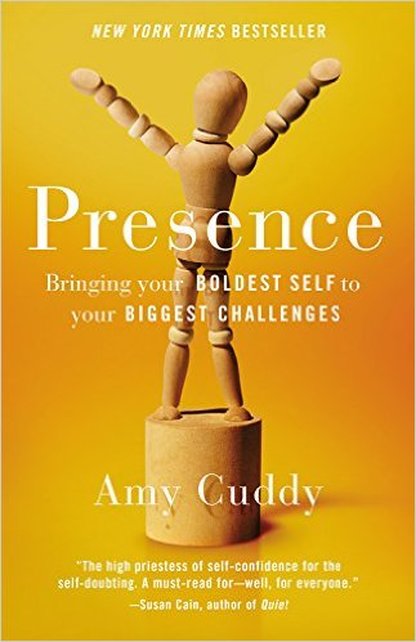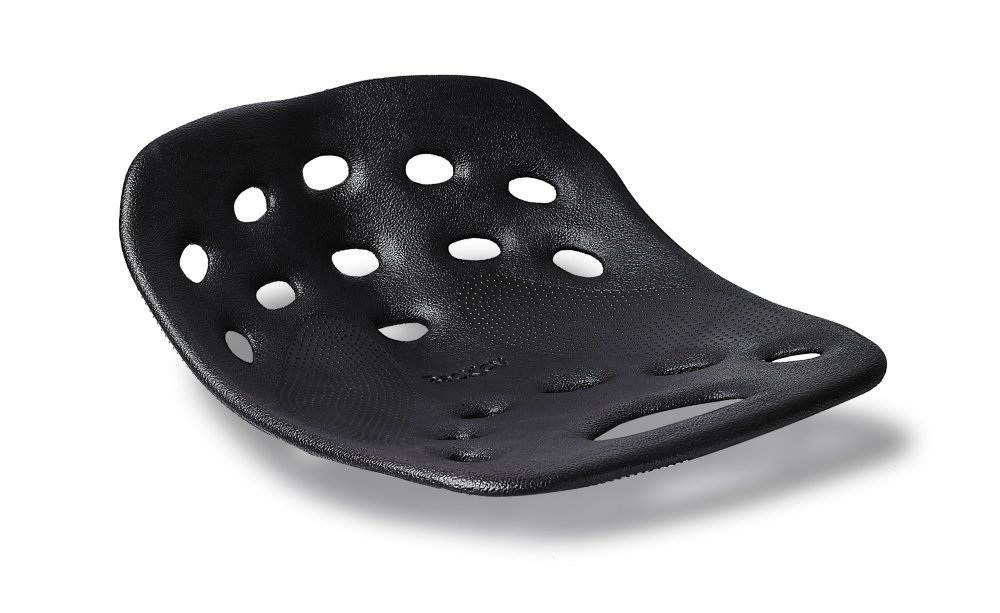Each Inch of Your Height is Worth $789 Per Year -- But There Is Hope For the Vertically Challenged.2/3/2016
Not all inches are created equal.
Once upon a time, our country's economy was built largely manual labor. Naturally, height and strength were associated with a notable increase in earning potential -- larger and stronger men could work more effectively than shorter, weaker ones.
However, as we transitioned into the knowledge and digital economies, more and more jobs became sedentary. Few jobs now are done better by tall men (or women!) than short ones. Yet for both genders, there is still a relationship between height and wages. A 2015 study by Andreas Schick and Richard H. Steckel found that people in the 75th percentile of height made 9-15% more than people in the 25th percentile. Additionally, a 2004 study by psychologist Timothy A. Judge and Daniel M. Cable found that every inch of height amounts to a salary increase of about $789 per year (the study controlled for gender, weight and age). Meaning that, on average, someone who is 6'0 earns $5,525 more per year than someone who is 5'6. Which, compounded, adds up to hundreds of thousands of dollars over one's career.
The Returns on an Additional Inch, for Men. From The Financial Perks of Being Tall
Moreover, height seems to play a role in your likelihood to get promoted to leadership positions. As Malcolm Gladwell wrote in Blink: The Power of Thinking Without Thinking (a must-read for anyone who hasn't already read it):
The heads of big companies are, as I’m sure comes as no surprise to anyone, overwhelmingly white men, which undoubtedly reflects some kind of implicit bias. But they are also virtually all tall: In my sample, I found that on average CEOs were just a shade under six feet. Given that the average American male is 5’9″ that means that CEOs, as a group, have about three inches on the rest of their sex. But this statistic actually understates matters. In the U.S. population, about 14.5 percent of all men are six feet or over. Among CEOs of Fortune 500 companies, that number is 58 percent. Even more strikingly, in the general American population, 3.9 percent of adult men are 6’2″ or taller. Among my CEO sample, 30 percent were 6’2″ or taller. Read more >
Obviously, this is skewed by the fact that women and minorities aren't typically CEOs. But still. There are tens of thousands of qualified short men who could be filling these roles... but for whatever reason, they aren't. (And, as Gladwell points out, while there are committees that work to add gender and racial diversity to management positions in companies, there is no such movement to promote more short people.)
For decades, scientists have argued about why this is true. Some argue that our brains associate height with power, so it is easy to unconsciously confuse the two. (Speaking of power -- learn to increase yours in three easy steps.) Meaning the difference has nothing to do with the person, and everything to do with how society perceives them.
Others argue that there are actual cognitive differences between taller and shorter people. Indeed, taller three-year-olds do better on certain cognitive tasks than shorter ones. And yes, we know that taller children are treated differently by teachers throughout elementary, middle and high school -- but, presumably, at such a young age, these social differences haven't had time to significantly impact cognitive ability. So if the difference isn't due to nurture... it might be due to nutrition. One of the biggest detriments to height -- as well as cognitive development -- is nutrition. (Fun fact: some evolutionary psychologists believe that the reason we find long legs so attractive in women is because it is a sign of health and resilience. If anything ever interrupts a child's physical development -- including poor nutrition, disease, and emotional trauma -- the first thing that stops growing is their legs. Meaning people with long legs are more, and people with long torsos are less, resilient. Read more > )
SO resilient!
Still other scientists argue that the difference is in confidence and social skills. This argument is supported by a 2001 study by Nicola Persico, Andrew Postlewaite and Dan Silverman. Their research found that that earning potential is more closely related to a man's height at age 16 than during adulthood.
"Those who were relatively short when young," the authors wrote, "were less likely to participate in social activities associated with the accumulation of productive skills and attributes, and report lower self-esteem." Lower self-esteem and underdeveloped social skills make a difference in the workforce. People who lack confidence are generally seen as less authoritative, and must work harder to convince employers of their worth and leadership potential. The truth, according to Schick and Steckel's aforementioned study, is that all of these probably play a role: Taller children have higher average cognitive and noncognitive test scores and each aptitude accounts for a substantial and roughly equal portion of the stature-earnings premium.
This could explain why so many women are willing to kill their feet by walking around in 5-inch heels. (Not me -- I'm already so tall that if I wear heels, I have a hard time hearing people.) But what's a short guy (or gal) who doesn't want to wear heels to do?
I'm glad you asked! Here's what I'd recommend: 1. Start getting the most out of the body you have. You may not be tall -- but you can still exude power, confidence and strength by making just a few adjustments to your posture and body language. As social psychologist and Harvard Business School Professor Amy Cuddy said in her now-famous TED Talk:
If you liked her talk, be sure to check out her brand new and already best-selling book, Presence: Bringing Your Boldest Self to Your Biggest Challenges.
Find it on Amazon, or get it for free with your 30-day free trial of either Kindle Unlimited or Audible.
Other recommended reading: Instantly Increase Your Power With This ONE Speaking Trick; Learn One of the Most Powerful Psychology Hacks Ever Invented (it only takes a few minutes); and The Confidence Effect, by Grace Killelea.
2. Improve your posture. Want to know the fastest way to look ten pounds lighter and several inches taller? Not to mention feeling healthier throughout your day? Fix your posture! (Your grandma will be proud.) Some quick tips:
There are also several products you can use to help you stand (and sit) taller. Most notable is the Lumo Lift Posture Coach and Activity Tracker, available on Amazon for $78.99.
Another great (and cheaper) product is the BackJoy SitSmart Posture Plus. Full disclosure: I do not own one of these, but I have tried them out at ZombieRunner in Palo Alto. It takes a few tries to figure out exactly how it works -- but once it clicks, you'll feel the difference immediately.
Simply place it on your chair before sitting and let the BackJoy do its magic. (Also, it totally comes in pink!)
Finally, you can check out posture braces. I don't know much about these, but they seem to be a pretty popular option. According to wikihow, you can accomplish a similar effect by placing an X on your back using tape.
3. Exercise.
Through exercise, you can both train yourself to stand taller and build your muscles, such that you exude more strength and power. Yoga and rock climbing are both excellent choices, as they help you build strength as well as teaching you body awareness. Strength training, too, can be effective at both improving your posture and building muscle mass. Not to mention, exercise is good for your social, physical and emotional wellbeing. Even if no one can see the difference in your fitness, when you feel better about your body, your confidence will show.
I love this picture of me climbing at the rock wall. #ChooseBeautiful
What's your experience with height in the workplace? In the dating world? What are your favorite posture tips? Let me know in the comments!
7 Comments
Kira
4/20/2017 01:43:03 pm
I guess this makes being too tall to ever wear heels on dates... totally worth it?
Reply
9/5/2017 12:42:58 pm
I feel your pain. (Emotionally. Physically, though, I'm sure our feet feel great!)
Reply
John
9/2/2017 05:08:02 pm
So I guess my short stature (5'7'') is the reason why I have to forego eating just to pay my bills?
Reply
9/5/2017 12:41:46 pm
I'm sure it doesn't help... But there could be other factors, too. Where you live, what job/career you have, etc.
Reply
George
5/30/2020 09:46:14 am
Dating as a short guy can be rough. I notice a major difference in how women react to me based on whether I'm taller than them or not. I even had a woman show up to a first date after a few days of lively chat on Tinder, only to leave after about 5 minutes because I was "half her size". We're both 5'6".
Reply
Ronnie Childs
1/5/2024 07:34:22 am
Yes, in the dating world, male height is a desired trail, but there are limits. I know from long experience and observation that a man can be too tall. At my height of 6-8, I have clearly passed over into the sideshow-freak zone with some women. With others it appear to be perceived as attractive, and with others a non-issue. There is a popular (with tall people, anyway) Reddit site that concurs with my observations. I spent a good part of my younger life trying to figure out which women were in which category.
Reply
Leave a Reply. |
About the Author

Eva is a content specialist with a passion for play, travel... and a little bit of girl power. Read more >
Want to support The Happy Talent? CLICK HERE!
Or Find me on Patreon!
What's Popular on The Happy Talent:
Trending in Dating and Relationships:
What's Popular in Science: Playfulness and Leisure Skills:
Popular in Psychology and Social Skills:
Categories
All
|

































 RSS Feed
RSS Feed